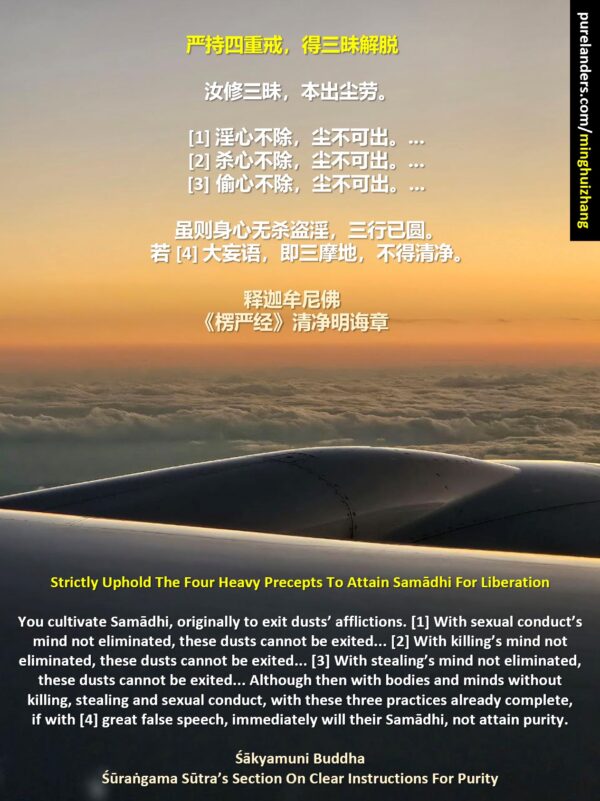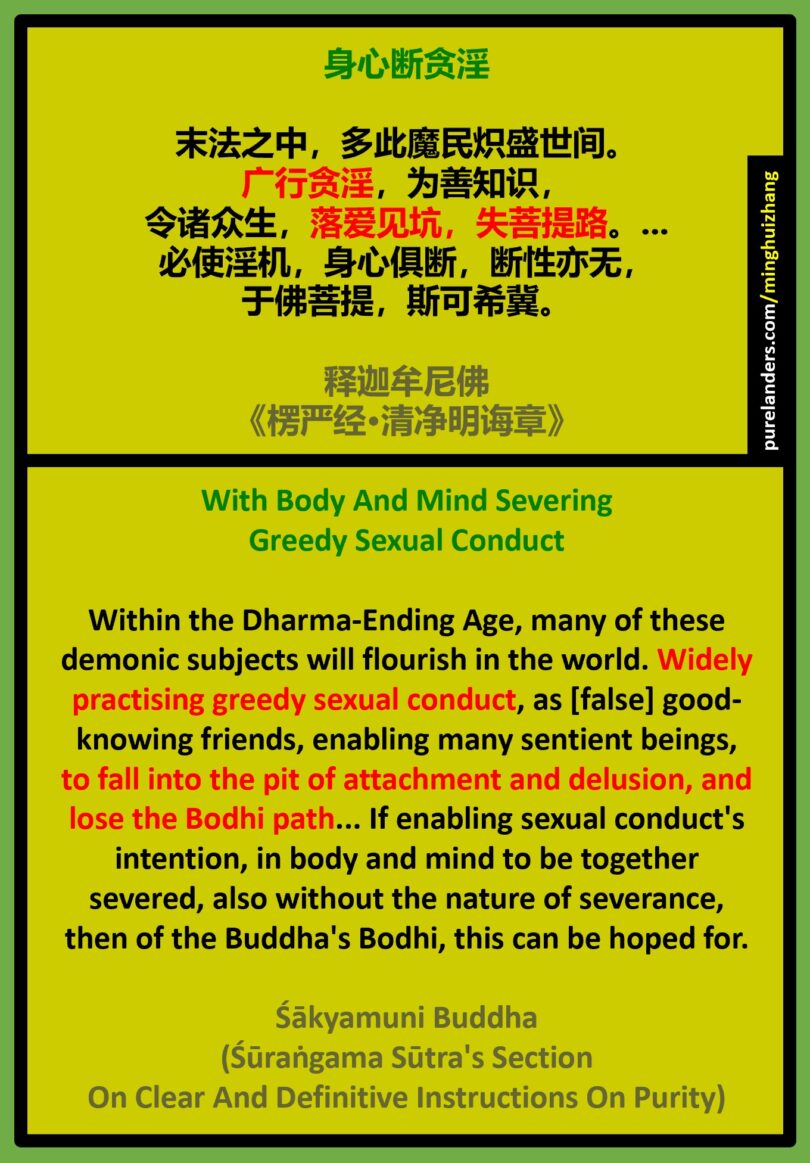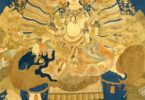
《大佛顶首楞严经》卷第六:四种决定清净明诲章:第一重戒
[The] Great Buddha’s Crown’s Śūraṅgama Sūtra’s Sixth Scroll: Section [On] Four Kinds [Of] Clear [And] Definitive Instructions [On] Purity: First Heavy Precept
【释迦牟尼】佛告阿难:「汝常闻我毗奈耶中,宣说修行三决定义。所谓摄心为戒,因戒生定,因定发慧,是则名为三无漏学。
[Śākyamuni] Buddha told Ānanda [1], ‘You often hear within my Vinaya [2], proclamation [of] cultivation [of] practice’s Three Definitive Laws [3]. That called gathering [of the] mind as Precepts [4] [is to], due to [the] Precepts, give rise [to] Concentration [5], [and] due to Concentration, give rise [to] Wisdom [6], [which] are then named as [the] Three Learnings Without Outflows [7] [8].

阿难,云何摄心我名为戒?若诸世界六道众生,其心不淫,则不随其生死相续。汝修三昧,本出尘劳。淫心不除,尘不可出。
Ānanda, what is gathering [of the] mind, [that] I name as [the] Precepts? If [the] six paths’ [9] sentient beings [of] all worlds, [are with] their minds without sexual [conduct] [10], then [will they] not follow it [with] births [and] deaths [in] continuous succession. [11] You cultivate Samādhi [12], originally [to] exit dusts’ afflictions [13]. [With] sexual [conduct’s] mind not eliminated, [these] dusts cannot [be] exited [14].
纵有多智禅定现前,如不断淫,必落魔道。上品魔王,中品魔民,下品魔女。彼等诸魔,亦有徒众,各各自谓成无上道。
Even if having much wisdom [and] meditative concentration [15] manifesting presently, if not severing sexual [conduct, there will] definitely [be] fall [into] demonic paths [16]. [With those] high grade [becoming] demon kings, [those] middle grade [becoming] demonic subjects, [and those] low grade [becoming] demonic women. Those [and] all other demonic hordes, likewise have assemblies [of] disciples, [with] each [and every] one self-saying [to have] accomplished [the] unsurpassable path [17] [18] [19].
我灭度后,末法之中,多此魔民炽盛世间。广行贪淫,为善知识,令诸众生,落爱见坑,失菩提路。
After I enter Parinirvāṇa [20], within [the] Dharma-Ending Age [21], many [of] these demonic subjects [will] flourish [in the] world. Widely practising greedy sexual [conduct], as [false] good-knowing friends [22], enabling many sentient beings, [to] fall [into the] pit [of] attachment [and] delusion, [and] lose [the] Bodhi path [23] [24].
汝教世人修三摩地,先断心淫,是名如来先佛世尊,第一决定清净明诲。
You [should] teach [the] world’s people [who] cultivate Samādhi, first [to] sever [their] minds’ sexual [conduct, as this] is named [as the] Thus Come [One’s [25] and] prior Buddha World-Honoured [Ones’] “First Clear [And] Definitive Instruction [On] Purity”.
是故阿难,若不断淫,修禅定者,如蒸沙石,欲其成饭,经百千劫,只名热沙。何以故?此非饭本,沙石成故。
Therefore, Ānanda, if not severing sexual [conduct], those cultivating meditative concentration, [are] like steaming sand [and] stones, desiring them [to] become rice, [that after] passing [a] hundred thousand kalpas [26], [are] only named [as] hot sand. Why [is this] so? These [are] not rice originally, [with] sand [and] stones composed thus [27].
汝以淫身,求佛妙果,纵得妙悟,皆是淫根。根本成淫,轮转三途,必不能出。
You, with sexual [conduct’s] bodies, seeking Buddhahood’s wonderful fruit, even if attaining wonderful awakening, are all [with] sexual [conduct’s] root. [With the] root becoming sexual [conduct, there is] rebirth [in the] three paths [28], definitely not able [to] exit [them] [29].
如来涅槃,何路修证?必使淫机,身心俱断,断性亦无,于佛菩提,斯可希冀。
[Of the] Thus Come [One’s] Nirvāṇa [30], what [is the] path [of] cultivation [for] realisation? If enabling sexual [conduct’s] intention, [in] body [and] mind [to be] together severed, also without [the] nature [of] severance, [then] of [the] Buddha’s Bodhi [31], this can [be] hoped [for] [32].
如我此说,名为佛说。不如此说,即波旬说。」
Such that I [have] spoken, [is] named as Buddhas’ speech. Not such [as] spoken, is Pāpīyāms’ [33] speech [34].’ [35]
字汇,小结,注解
Glossary, Summaries And Notes:
[1] Ānanda (阿难): The Buddha’s personal attendant monk, here representing the audience, including us.
[2] Vinaya (毗奈耶): (Monastic) discipline with moral rules and regulations.
[3] Three Definitive Laws (三决定义): Three Learnings Without Outflows (三无漏学) [7]
[4] Precepts (戒): Moral guidelines, especially those taught in this section.
[5] Concentration (定): Samādhi (三昧;三摩地) [12]
[6] Wisdom (慧): Insight realised on how to guide one and all to Buddhahood (佛果).
[7] Three Learnings Without Outflows (三无漏学): Precepts (戒) [4], Concentration (定) [5] and Wisdom (慧) [6] that lead to the end of the three poisons (三毒) of greed (attachment) (贪), hatred (aversion) (嗔) and delusion (ignorance) (痴), thus preventing any of them from flowing out through body (身), speech (口) and mind (意).
[8] Summary (1): The Three Definitive Laws (三决定义), which are the Three Learnings Without Outflows (三无漏学) should be practised, beginning with gathering of the mind as Precepts (戒), which in turn gives rise to Concentration (定), which in turn gives rise to Wisdom (慧).
(The Three Learnings can be understood with the analogy of our present minds being polluted, choppy and murky lakes, which require clearing of its dirt, representing avoiding of evil by training to observe the Precepts. This is followed by calming of the water, representing training for Concentration. Finally is to peer through the stilled water to directly perceive and retrieve the treasure at its bottom, representing training for Wisdom.)
[9] Six paths (六道): Realms of hell-beings (地狱众生), hungry ghosts (饿鬼), animals (畜生), human beings (人), asuras (阿修罗) and heavenly beings (天人).
[10] Without sexual conduct (不淫): Avoiding all forms of sexual conduct is necessary for liberation, as lust is one of the primary forms of greed for (fleeting) pleasure that binds us to rebirth. With the last thought usually related to lust before taking rebirth, this karmically connects to the next worldly rebirth. This is how lust traps us life after life, and why it has to be eradicated for liberation. As the Buddha was speaking especially to monastics, who were already training with celibacy, he spoke of severing lust directly, at the level of the mind too.
For lay Buddhists, celibacy is not expected immediately, although sexual misconduct still has to be avoided, while lust should also be severed periodically, gradually and eventually if liberation is to be attained. To train towards this, there can be regular observation of the Eight Precepts (八戒), which requires abstaining from all sexual conduct.
During daily practice sessions and retreats too, including on the deathbed, lust must be relinquished in thought and deed. Wholeheartedly mindful of Buddha (一心念佛) when dying, there should be no more thoughts connected to sex. This effectively becomes renunciation of sexual conduct for good, as there will be no more such thoughts arising after connecting to the Buddha and with reaching of his Pure Land (净土).
[11] When thoughts of sexual conduct are eradicated from the mind, there will be no deeds of sexual conduct, and thus no creation of evil karma (恶业) from sexual conduct that binds us to rebirth (轮回).
[12] Samādhi (三摩地): Meditative concentration (禅定) for progress towards attainment of wisdom (智慧).
[13] Dusts’ afflictions (尘劳): Concerns, burdens or labours (劳) of worldly life. There are the six dusts (六尘) of sight (form) dust (色尘), sound dust (声尘), smell dust (香尘), taste dust (味尘), touch dust (触尘) and dharma (thought) dust (法尘). Afflictions (烦恼) are troubles of suffering arising from relating to the six dusts with the three poisons (三毒) of greed (attachment) (贪), hatred (aversion) (嗔) and delusion (ignorance) (痴).
[14] Summary (2): As the Precepts (戒) observed well form the foundation for cultivating Samādhi (三摩地), that leads to Wisdom (智慧) for liberation (解脱) from all afflictions (烦恼), breaking this First Heavy Precept (第一重戒) against sexual conduct makes liberation impossible.
[15] Meditative concentration (禅定): [12] Samādhi (三昧)
[16] Demonic paths (魔道): Paths of becoming (like) malevolent evil ghosts (恶鬼), by possession and/or in person as demons (魔). The demons taught here can be collectively considered as the demons in the ‘Fifty Aggregates’ Demons Section’《五十阴魔章》, as detailed at the end of this sūtra.
[17] Unsurpassable path (无上道): The way to supreme enlightenment; i.e. the fruit of Buddhahood (佛果).
[18] Self-saying to have accomplished the unsurpassable path (自谓成无上道): This is to break the Fourth Heavy Precept (第四重戒).
[19] Summary (3): If there is much theoretical (but not actual realised) wisdom and practical meditative concentration (禅定), but with breaking of this Precept, due to the strong evil karma (恶业) created, this at best leads to rebirth as demons (魔) with various powers, but never to liberation (解脱). Due to possibly having some remnant good karma (善业), they might be able to lead some minor demons. However, they will mislead themselves and others into thinking they are already Buddhas, (thus creating more evil karma for more suffering to come, keeping liberation even further away).
(True Concentration [定] and true Wisdom [慧] must arise from the Precepts [戒] being truly observed. Otherwise, what manifests as ‘concentration’ or ‘wisdom’ could be from one’s greedy and deluded minds, fooling oneself, and/or from external demons fooling oneself, to mislead one to serve them, and/or to eventually become reborn as one of them.)
[20] Parinirvāṇa (灭度): The Buddha’s relinquishment of his manifested physical form after completing his teachings and fulfilling his karmic affinity with sentient beings in his time.
[21] Dharma-Ending Age (末法时期): This current period of 10,000 years we are in, when the quality of the Right Dharma (正法) being taught, learnt, practised and realised is in general decline.
[22] Good-knowing friends (善知识): Spiritual friends who befriend with sharing of the Right Dharma (正法).
[23] Bodhi path (菩提路): Path to Buddhahood (佛果)
[24] Summary (4): Such evil beings will become innumerable in this Dharma-Ending Age (末法时期), who claim that with sexual conduct, one can attain Buddhahood (佛果), (thus misleading many to also break this Precept. They might claim that sexual conduct is inconsequential to the physical and spiritual welfare of one and all. This clearly does not make sense as sentient beings’ physical and spiritual lives are at stake).
[25] Thus Come One (如来): The Buddha, who ‘as if came’ to be, from awakening of always present Buddha-nature (佛性); potential for Buddhahood.
[26] Kalpas (劫): One world cycle, the time for a world to be formed and destroyed, about 1,334,000,000 years.
[27] Summary (5): Those not severing sexual conduct will not be able to cultivate true meditative concentration (禅定). (All Buddhas teach in the same way for guiding all to perfect their Precepts, so as to perfect meditative Concentration, and to perfect realisation of Wisdom. Those who stubbornly reject this teaching by refusing to see its sensibility surely lack wisdom, while having much passive and/or active greed for sexual conduct and rebirth [轮回].)
[28] Three paths (三途): Realms of hell-beings (地狱众生), hungry ghosts (饿鬼) and animals (畜生). (See Note [9])
[29] Summary (6): So-called ‘awakening’ without severing sexual conduct will either be not very great or even false. (See Note [19]) In the worst cases, there will eventually be rebirth in the three paths (三途) with much suffering when good karma (善业) exhausts, with much evil karma (恶业) left.
[30] Thus Come One’s Nirvāṇa (如来涅槃): Buddhahood (佛果)
[31] Buddha’s Bodhi (佛菩提): Buddhahood (佛果)
[32] Summary (7): To progress towards Buddhahood (佛果), (among other practices needed), sexual intention and conduct should be severed. This severance should be so thorough, that there is no need to suppress lust at all, or to even think of severance.
(Yet, just as it is difficult, in this Dharma-Ending Age [末法时期], to instantly and totally sever lust in this lifetime, it is difficult to realise Buddhahood [佛果] here and now. However, the Buddha taught the practice of mindfulness of Buddha [念佛] as a most skilful means [方便] to regularly, at least suspend workings of all three poisons [三毒], including greed as lust in everyday life. See Note [10].
With sufficient personal practice and support-chanting [助念], this can surely also be done on the deathbed too. Connecting one’s Buddha-nature [佛性] with Āmítuófó [阿弥陀佛: Amitā(bha) Buddha] instead any of the poisons, his Pure Land [净土] will be reached, where there will be no more outflows of the poisons, with the swiftest progress towards Buddhahood.

Having connection of limited Self-power [自力] with the Buddha’s great Other-power [他力], mindfulness of Buddha was also taught by the Buddha to be an unsurpassable meditative practice [for Samādhi (三摩地)]. From the Mahāsaṃnipāta [Great Collection] Sūtra《大集经》, ‘If a person is only mindful of Āmítuófó, this is named as the unsurpassable, profound and wonderful meditation.’ [若人但念阿弥陀,是名无上深妙禅。])
[33] Pāpīyāms (波旬): Māra-Pāpīyāms (魔波旬) in full. ‘Pāpīyāms’ is an epithet meaning ‘The Evil One’. ‘Māra’ (魔罗) means ‘Bringer Of Death’. He is the Demon King (魔王), a god ruling the Sixth Desire Realm Heaven (欲界天), as a heavenly demon (天魔). He is also named Namuci (那牟质), which means ‘Non-Releaser’, as he personifies death, which does not allow anyone to escape from its grasp (unless with the Right Dharma [正法] practised in time).
[34] Summary (8): The Buddha is thus unequivocally conclusive on the above, while warning all that any other teachings that counter these are not only non-Buddhist teachings, but are those of the most evil one, capable of harming many sentient beings’ physical and spiritual lives, keeping one another trapped in rebirth. These teachings are not to be compromised for the goal of Buddhahood.
[35] Summary (9): Due to the severity of sexual conduct (and thought) in obstructing liberation, and with the main audience of this teaching being monastics, who are supposed to be committed to celibacy to attain liberation, note that different from the sequence of the Five Precepts (五戒) for laypersons, which are to abstain from (1) killing (不杀生), (2) stealing (不偷盗), (3) sexual misconduct (不邪淫), (4) lying (不妄语) and (5) intoxicants (不饮酒), here, Precept (3) is moved ahead to ‘be’ the First Heavy Precept (第一重戒), with the criterion becoming to abstain from sexual conduct entirely. Thus, Precept (1) is realigned to ‘be’ the Second Heavy Precept (第二重戒), Precept (2) is realigned to ‘be’ the Third Heavy Precept (第三重戒), while Precept (4) remains ‘as’ the Fourth Heavy Precept (第四重戒).
Precept (4) is usually taught to include abstaining from double-tongued speech (不两舌),harsh speech (不恶口) and frivolous speech (不绮语) too.
Of course, Precept (5) should be abided by all monastics and laypersons too, to prevent intoxication, which is to lose mindfulness, thus possibly breaking all other Precepts. By itself, consuming of intoxicants might not harm, especially if not intoxicated, but it might impair mindfulness, making it easier to break the other Precepts. The addictiveness of intoxicants can impair mindfulness by giving rise to distracting craving for them too.
The Fifth Precept is not highlighted as a separate Precept here because it is a Preclusive Precept (遮戒), a protective restriction for preventing breaking of the Natural Precepts (性戒), as represented by the Four Heavy Precepts (四重戒), which are naturally aligned to our Buddha-nature (佛性), as the basis of our innate Precepts’ Essence (戒体) or moral nature, whether we learn or commit to these Precepts or not. To break these Precepts thus is to have transgressions against our original nature (本性), to create negative karma (恶业), even if not harming others.
In various systems of Bodhisattva Precepts (菩萨戒), the Heavy Precepts (重戒) are regarded as Natural Precepts (性戒) too, while the Light(er) Precepts (轻戒) are regarded as Preclusive Precepts (遮戒), although all should be abided by, for perfecting the path of moral practice. Fundamentally speaking, all various Precepts are extensions from the Four Heavy Precepts (四重戒) here.
Namo Amituofo : Translation, glossary, notes and summaries by Shen Shi’an
上序
Previous Preface:
《楞严经·四种清净明诲章》序
[0] Śūraṅgama Sūtra’s Section On Four Kinds Of Clear Instructions On Purity’s Preface
https://purelanders.com/2021/05/21/four-kinds-of-clear-instructions-on-puritys-preface
下个戒条
Next Precept:
第二重戒
[2] The Second Heavy Precept
https://purelanders.com/2021/05/20/second-heavy-precept
全文
Complete Text:
purelanders.com/minghuizhang






